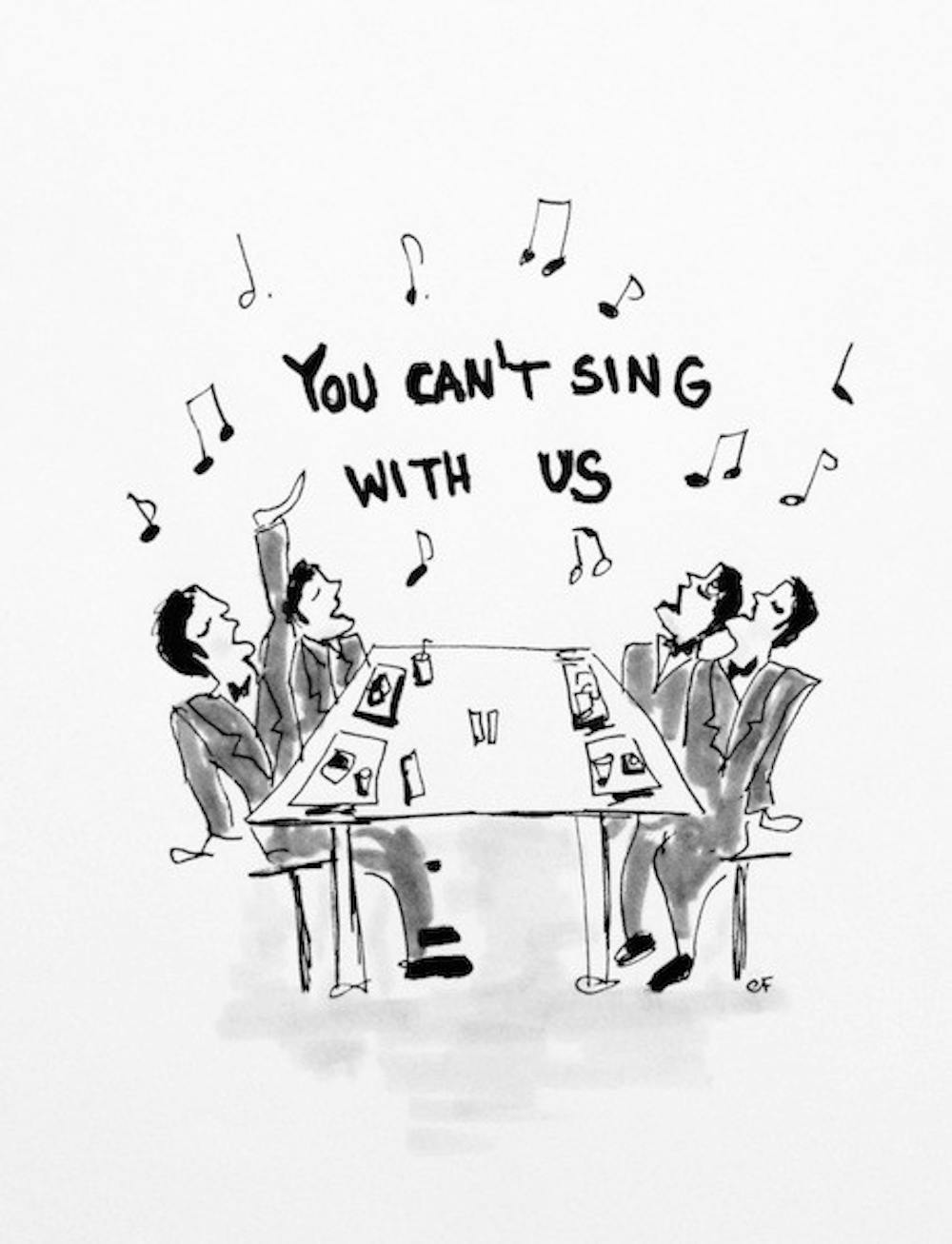Taken aback I was when I read all the hullabaloo regarding the benefits of being an athlete on campus. I find the apparent miscommunication between athletes and non-athletes to be particularly shameful, considering how moderate and levelheaded Middlebury students tend to be when discussing social issues. Regardless of the extent to which we participate in athletics, a substantial majority of Middlebury students are Non-A cappella Regular People (NARPs).
As a two sport athlete with close ties to the a cappella community, I am constantly reminded about the benefits a cappella students enjoy – benefits of which most athletes can only dream. One of Middlebury’s premier a cappella groups, Dissipated 8, recently travelled around the Northeast to perform dozens of live concerts. What makes me so irate is that this school organization can profit by selling compact discs (i.e. CDs) to their adoring fans. The double standard is nauseating; if I as an athlete tried to sell my autograph or jersey to any of the 30 student fans at a football game, or even if I tried to profit from my likeness being used as part of Middlebury’s promotional material, I would be severely disciplined.
Tis the plight of a NARP, both for athletes and non-athletes – athletes cannot profit from playing their sport and non-athletes cannot profit from anything (what would they sell? Art? Literature? HA!) These a cappella students, supposedly on equal footing with other students, clearly rise above the rest. The puppets (a.k.a. Middlebury students) venerate a cappella people to absurd degrees. We pack Mead Chapel for their “Jambos,” we attend every show they casually offer to appease the masses, we vie for their love and attention. I so often hear women swooning for Zach Weiss ’15, a member of the Dissipated 8, that when I tried to keep track of how many times it happened I lost count in the low triple digits. Athletes certainly do not enjoy these luxuries (except the men’s basketball team, but whatever).
Comments made by Will Fleming ’17, also in Dissipated 8, affirm my thoughts about the social privileges enjoyed by a cappella groups. “Yeah we throw parties and stuff,” Fleming describes, “girls love you for it, guys love you for it.” As a NARP, I could not imagine throwing a party with my athlete friends and having people ‘love me for it.’ I truly admire the a cappella culture where one is able to have social gatherings with friends yet not have others deem your culture toxic and exclusive. When asked a carefully worded follow-up question about this very point, Fleming responded, “both.”
Next, I asked Fleming about the bonds of friendship formed in a cappella. He explained that, upon his entering into the a cappella world, he “immediately had a group of brothers,” denoting the friendships formed with his singing mates. As Hannah Bristol ’14.5 and Isaac Baker ’14.5 rightfully acknowledge, it is unfair for these people to gain friends based on shared group membership while “the [non-athletes] are hunting for their own community, building friendships around any other shared interest.” We might as well make some big NARP group just so everyone can say they are included in something, our inability to sing well uniting us all.
Last week, Harry Zieve-Cohen ’15 wrote an Op-Ed exploring if Middlebury leaves us with better values than when we entered. The answer, Harry, is no – Middlebury as an institution is failing us. “We are paying into a system that fetishizes” a cappella. How can we let our students graduate into a world that does not share the same fetishization of a cappella that we do? It will rip apart the fragile minds of all but the mentally toughest Middlebury alumni.
To conclude, I’ll again invoke the words of Bristol and Baker (with a slight twist):
“We are a DIII school. Very few, if any, of our current [singers] will ever seriously [sing in an a cappella group] again after college. And yet for these four years, they are disproportionately valorized and require a tremendous time commitment [sic]. Students get tremendous enjoyment out of [a cappella]. They have learned teamwork and leadership, made their best friends and love their [singing] experience. But let’s be honest. You can reap these benefits without dedicating most of your time to your [a cappella group].”
Bristol and Baker are correct in recognizing that NARPs can have experiences rivaling or surpassing those of a cappella people. Do not feel intimidated by the social reverence the sheeple grant to a cappella groups. Whether you’re a NARP or a singer, your Middlebury experience is what you make of it.




